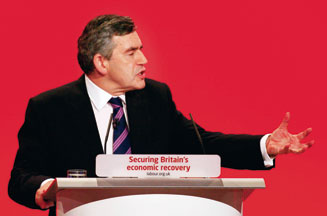
Election fever was in the air in Brighton, venue for this year's Labour Party conference.
Many fringe sessions focused on how the party, which is lagging behind the Tories in the polls, should go about marketing itself to voters in the run-up to the next general election, which is expected to be held in May 2010.
There was an acknowledgement that Labour's woeful finances - it is millions of pounds in debt - mean the party needs to think differently to get its message across to the electorate.
Labour's new-media campaign spokeswoman Kerry McCarthy MP said that while the Conservatives would be able to rely on direct marketing bankrolled by billionaire donor Lord Ashcroft, her party could not call on such resources.
‘Twitter and Facebook is where the fight is going to be,' she said at an event aptly entitled ‘Tweet 4 Victory'. After The Sun's endorsement of the Tories, McCarthy tweeted: ‘Labour doesn't need The Sun. We've got Twitter.' This prompted derision from some sections of the blogosphere who said Twitter was no substitute for the support of Britain's top-selling newspaper.
Turning to tweets
Douglas Alexander, the international development secretary and Labour's election campaign co-ordinator, also seemed to hint at a move away from above-the-line media for the election.
In an interview with Tweetminster, a web service that helps people to follow politicians on Twitter, he said: ‘I think that all the traditional channels of political communication that we are familiar with are atrophying.
‘If you look at the number of people who recall a political poster from this election compared with previous elections, the numbers are down.'
Lord Mandelson's extension of the car scrappage scheme was a welcome surprise for automotive marketers. The business secretary's plan will provide money for an additional 100,000 cars and vans.
However the decision did not go down well with everyone. At one of the many green fringe events, Andrew Simms, policy director of the New Economics Foundation and head of its climate change programme, attacked the scrappage scheme as having ‘non-existent environmental credentials'.
‘It's not all about getting everyone back in the high street spending money that they haven't got and buying things they don't need,' he added.
Lord Rooker, chairman of the Food Standards Agency, attended fringe meetings organised by The Co-operative and Asda where he touched upon the issue of traffic-light labelling.
His statement that big companies with household-name brands had been using this approach ‘for ages in different ways' and that the proposed system enjoyed ‘overwhelming support' was at odds with most observers' analysis of the debate on this issue.
When asked by Marketing if there was any point in pursuing the scheme, given that the EU, the Tories and most of the food industry prefer the alternative guideline daily amounts labelling system, he sidestepped the question, citing the ongoing consultation.
Speeches from the podium are mainly intended to enliven the party faithful, so culture secretary Ben Bradshaw deftly avoided mention of his U-turn on allowing product placement on television. The move is disliked by some in the party, notably health secretary Andy Burnham, Bradshaw's predecessor, who vetoed any change during his time in the role.
Bradshaw told Marketing that the forthcoming consultation on the issue would set out ‘safeguards' to protect vulnerable people. It is also understood that the consultation paper will present a range of options, including some that advocate tighter restrictions than the current EU guidelines.
However, the marketers who will end up being most affected by announcements made at this year's conference are likely to be those working in government departments. Gordon Brown's speech contained a number of costly eye-catching measures, including free personal care for frail older people, and the launch of a network of supervised homes for teenage mothers.
Later in the week it emerged that these policies would be partly funded through £400m of cuts to the Department of Health's marketing budget, which has been designated as a ‘lower priority area'.


